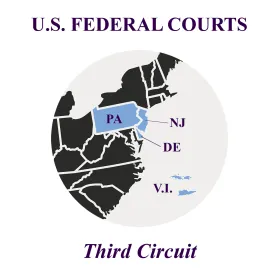Widening the split among circuit courts, the Third Circuit recently rejected attempts by two out-of-state employees to join an FLSA collective action as opt-in plaintiffs because their claims did not “arise out of or relate to” the defendant’s contacts with the state in which the case is pending.
In Fischer v. Federal Express Corp. et al., __ F.4th __ (2022), the district court rejected notices of consent to join the litigation filed by two former employees who had not worked for FedEx in Pennsylvania, where the FLSA collective action currently is pending. Because FedEx is based in Tennessee and incorporated in Delaware, Pennsylvania courts lack general jurisdiction over it and thus plaintiffs must establish specific jurisdiction.
Relying on Bristol-Myers Squibb Co. v. Sup. Ct., __ U.S. __, 137 S. Ct. 1773 (2017), the district court found that it lacked specific personal jurisdiction over FedEx with respective to the opt-in plaintiffs (one from Maryland and the other from New York) because “Fed. R. Civ. P. 4(k)(1)(A) requires a federal court to follow the personal jurisdiction rules applicable to a state court.” The FLSA does not provide for nationwide service of process and the court did not have personal jurisdiction to adjudicate the two potential opt-in plaintiffs’ wage and hour claims that arose out of or were related to the company’s conduct outside of Pennsylvania.
On appeal, the Third Circuit affirmed, finding a lack of personal jurisdiction over the claims of these employees to conduct that occurred in Pennsylvania. The New York and Maryland opt-in plaintiffs’ claims did not arise from FedEx’s Pennsylvania contacts, so “the initial service of a summons cannot be used to exercise jurisdiction over” the company on the opt-in plaintiffs’ claims. The court also rejected plaintiff’s analogy of the FLSA collective action to Rule 23 class actions, noting the two were “materially different.”
The decision aligns the Third Circuit with the Sixth and Eighth Circuits, which have arrived at the same conclusion. Thus, in these courts, “where the basis of personal jurisdiction in an FLSA collective action in a federal court is specific personal jurisdiction established by serving process,” opt-in plaintiffs must show that their “claim arises out of or relates to the defendant’s minimum contacts with the forum state.” In contrast, the First Circuit reached a different decision, allowing out-of-state plaintiffs to opt in when their claims “arise out of or relate to a defendant’s minimum contacts with the entire nation.” See Waters v. Day & Zimmermann NPS Inc., 23 F.4th 84 (2022). The court there found that barring out-of-state opt-ins would “frustrate” the purposes of an FLSA collective action and permitting employees to join together in a single action would increase efficiency.
In June 2022, the U.S. Supreme Court declined to take up this split, leaving employers with confusing procedural challenges over the scope of FLSA collective actions when the company is not based or incorporated in the state.


 />i
/>i

